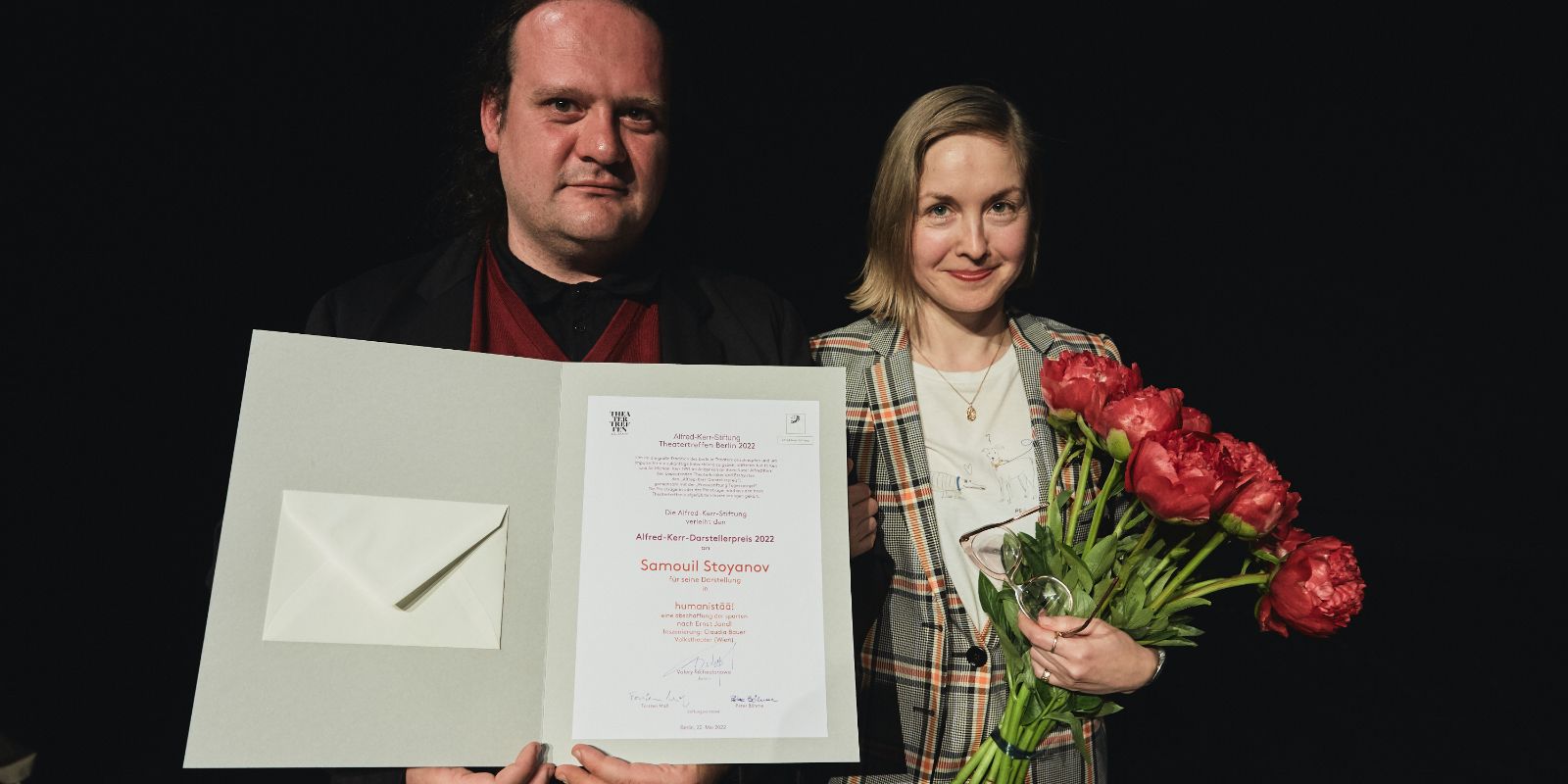Text | Speech | Theatertreffen 2022
Laudatio Alfred-Kerr-Acting-Award

The Alfred Kerr Actors' Prize recognises the outstanding performance of a young actor in one of the productions invited to the Theatertreffen. In 2022 Samouil Stoyanov was honoured for his role in Claudia Bauer's production of "humanistää! The juror was Valery Tscheplanowa.
Dear Audience, dear Teams of the Alfred-Kerr-Acting-Award and Theatertreffen!
I had the opportunity to see ten performances and to marvel ten different times. First, I was astonished by the still vibrant craft of punchlines and timing and the dovetailing of young and old theatre makers, who relished in getting one over each other in “Der Tartuffe oder Kapital und Ideologie”. I marvelled at the unpretentious and immediate willingness to tell a story, as in “Ein Mann seiner Klasse”. I marvelled at the delicate Japanese miniature “Doughnuts”, into which a handful of Europeans had been stuffed like sardines into a can, struggling for punchlines in an equally puzzled and entertaining manner, and I wondered at the fact that reading a text together can be a theatrical process, as in “All right. Good night.” I also marvelled at the countless small, winding twists, dead ends, detours and junctions in “Das neue Leben”, but even more at the fact that it was not humans who got the lion’s share of stage-time, but a revolving lamp.
And then I marvelled at myself. I could not allow actors whom I did not know to touch me or follow their instructions, even though I had bought a ticket that describes this very procedure as a theatre performance. I left “Die Ruhe” after three hours.
Finally, I marvelled at the fact that it appeared to me as if some of the theatre makers were still sitting at the rehearsal table or had only seemingly risen and gone onstage. It was as if they were trying to sell me a half-finished shoe and I was supposed to pay the full price for the unfinished shoe and an explanation of why the shoe is not finished. Also, I could not work out why a 200 year-old narrative that is described as outdated on stage (as in the case of “Die Jungfrau von Orleans”) is discussed nevertheless. Countless poets have been busy since that play was written, so surely a more suitable narrative could have been found? And until now, I had always thought that singing in the theatre was a different kind of singing, an immediate, unamplified, unadorned kind of singing – and when I enjoyed rehearsing and singing, I never missed the support of video, microphones and pompous costumes. Our colleagues from the pop business definitely have the better budget for these kinds of paraphernalia.
And if we have to have discourse, if we have to have theoretical chants, then they should be as unabashedly garish, charming and exuberant as in “Like Lovers Do (Memoirs of Medusa)”. In this show, I was astonished that so many drastic words in a colourful package generate something like cheerful forgiveness.
I saw young people, many young people, who wanted to play characters and had the ability to do just that and who – bypassing stage discourse and directing ambitions – smuggled their intention to tell the story of a person or a character down to me in the auditorium. Nikolai Gemel, who quietly carries off the life of a man in “Ein Mann seiner Klasse”, Philipp Grimm, Jannik Hinsch and Henriette Hölzel, who strip the roof of Staatsschauspiel Dresden in “Der Tartuffe oder Kapital und Ideologie”, Annemarie Brüntjen, who sketches the character of Joan of Orleans for 20 minutes, Vassilissa Reznikoff, who stubbornly dreams herself into a character as Agnes in “Die Jungfrau von Orleans”, Gro Swantje Kohlhoff who acts cinematically on stage without a camera, Vidina Popov, who wangles some stage time from that lamp in “Das neue Leben”, and Johannes Hegemann who finds a home in a foreign sense of humour as the Japanese hotel concierge in “Doughnuts”.
And then there was „humanistää!“. A human poem full of painful wit and danced language, and an ensemble to whom as a whole I would gladly give the Alfred-Kerr-Acting-Award cash. But it’s there: the difference.
Samouil Stoyanov, what a lump of precision and grace. From the very beginning, when he was still hidden by a mask, I asked myself who performed that belligerently danced language. Next, there was a lot of good ensemble work and then followed his great monologue – and Samouil Stoyanov turned Ernst Jandl’s clever, sparse sentences into a thoughtful act of strength; he sweats the language and turns our blood to ice by omitting the word “Dritter”. I only thought, please God, don’t let him be 50, because I had seen all imaginable ages, genders and characters walking about in this astonishing creature. So I ran into the street after the final applause and googled: Samouil Stoyanov, 33. Bingo! The 2022 Alfred-Kerr-Acting-Award goes to Samouil Stoyanov!
Thank you.